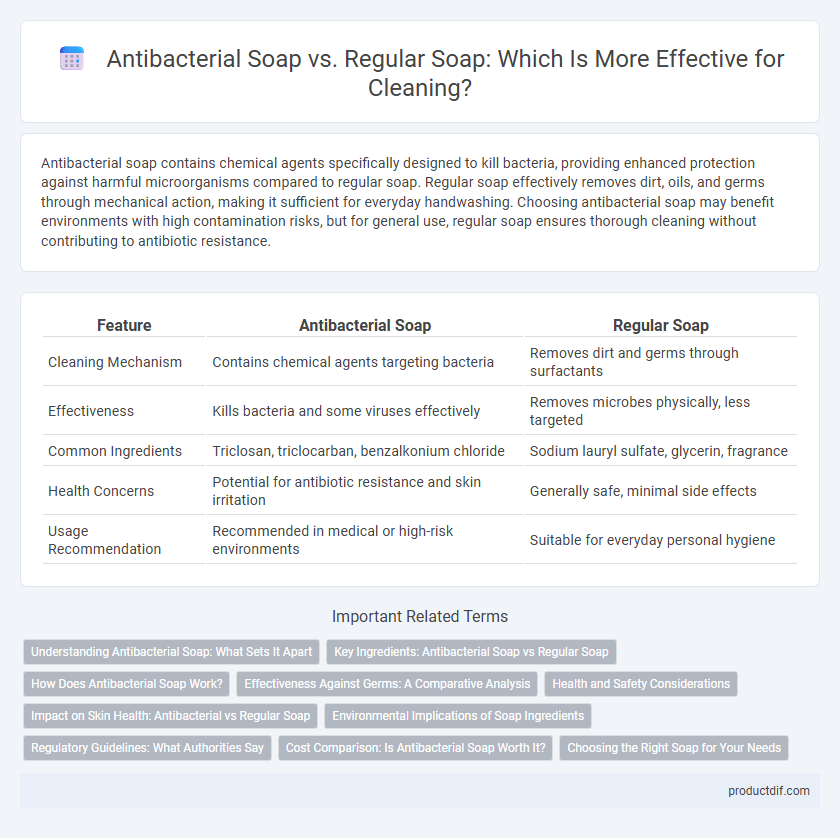Antibacterial soap contains chemical agents specifically designed to kill bacteria, providing enhanced protection against harmful microorganisms compared to regular soap. Regular soap effectively removes dirt, oils, and germs through mechanical action, making it sufficient for everyday handwashing. Choosing antibacterial soap may benefit environments with high contamination risks, but for general use, regular soap ensures thorough cleaning without contributing to antibiotic resistance.
Table of Comparison
| Feature | Antibacterial Soap | Regular Soap |
|---|---|---|
| Cleaning Mechanism | Contains chemical agents targeting bacteria | Removes dirt and germs through surfactants |
| Effectiveness | Kills bacteria and some viruses effectively | Removes microbes physically, less targeted |
| Common Ingredients | Triclosan, triclocarban, benzalkonium chloride | Sodium lauryl sulfate, glycerin, fragrance |
| Health Concerns | Potential for antibiotic resistance and skin irritation | Generally safe, minimal side effects |
| Usage Recommendation | Recommended in medical or high-risk environments | Suitable for everyday personal hygiene |
Understanding Antibacterial Soap: What Sets It Apart
Antibacterial soap contains specific chemical agents such as triclosan or triclocarban designed to kill or inhibit bacteria, unlike regular soap which primarily removes dirt and germs through mechanical action. The active ingredients in antibacterial soap target bacterial cell walls or metabolic processes, offering enhanced protection against harmful microorganisms. Understanding these differences helps consumers make informed choices about hygiene products based on effectiveness and safety concerns.
Key Ingredients: Antibacterial Soap vs Regular Soap
Antibacterial soap contains active ingredients like triclosan, triclocarban, or benzalkonium chloride, targeting and killing specific bacteria to reduce microbial presence. Regular soap primarily uses surfactants such as sodium lauryl sulfate or sodium laureth sulfate, which remove dirt and microbes through emulsification without directly killing bacteria. The effectiveness of antibacterial agents depends on concentration and contact time, while regular soap relies on mechanical action combined with rinsing to maintain hygiene.
How Does Antibacterial Soap Work?
Antibacterial soap works by incorporating active chemical agents such as triclosan or benzalkonium chloride that target and kill bacteria on the skin, disrupting their cell membranes or metabolic processes. Unlike regular soap, which removes germs primarily through mechanical action and water, antibacterial soaps chemically inhibit bacterial growth to reduce infection risk. Research shows that while antibacterial soaps can be effective against certain bacteria, their widespread use may contribute to antibiotic resistance and is not always more effective than regular soap in everyday handwashing.
Effectiveness Against Germs: A Comparative Analysis
Antibacterial soap contains active ingredients like triclosan or benzalkonium chloride that target specific bacteria, potentially reducing certain microbial populations more effectively than regular soap. Regular soap works by mechanically removing germs and debris through lathering and rinsing but does not kill bacteria chemically. Studies indicate both types effectively reduce microbial presence, with no conclusive evidence that antibacterial soaps significantly outperform regular soap in preventing illness during routine handwashing.
Health and Safety Considerations
Antibacterial soap contains active ingredients such as triclosan or benzalkonium chloride that target specific bacteria, reducing the risk of infections and enhancing hygiene in healthcare settings. Regular soap, while lacking these antibacterial agents, effectively removes dirt, grease, and microbes through mechanical action, minimizing the potential for bacterial resistance and chemical exposure. Choosing between antibacterial and regular soap requires balancing the benefits of targeted antimicrobial action against concerns about long-term safety and environmental impact.
Impact on Skin Health: Antibacterial vs Regular Soap
Antibacterial soap contains active ingredients like triclosan or benzalkonium chloride that target and kill bacteria, potentially disrupting the skin's natural microbiome and causing dryness or irritation with frequent use. Regular soap effectively removes dirt and microbes through mechanical action without introducing harsh chemicals, preserving skin barrier function and maintaining balanced microbial flora. Studies indicate that regular soap is generally safer for long-term skin health, minimizing the risk of sensitivity and microbial resistance compared to antibacterial formulations.
Environmental Implications of Soap Ingredients
Antibacterial soaps often contain triclosan or triclocarban, chemicals linked to water pollution and disruption of aquatic ecosystems due to their persistence and bioaccumulation. Regular soaps typically use biodegradable surfactants that break down more quickly, reducing environmental impact and lowering the risk of resistance development in microbial populations. Choosing soaps with plant-based, phosphate-free ingredients supports aquatic life and promotes sustainable wastewater treatment processes.
Regulatory Guidelines: What Authorities Say
The U.S. Food and Drug Administration (FDA) regulates antibacterial soaps, requiring manufacturers to prove their safety and effectiveness, while regular soaps are not subject to such stringent testing. Recent FDA guidelines have banned certain active ingredients like triclosan in antibacterial soaps due to insufficient evidence of added health benefits and potential risks. The Centers for Disease Control and Prevention (CDC) recommend regular soap and water for routine handwashing, as it effectively removes germs without contributing to antibiotic resistance.
Cost Comparison: Is Antibacterial Soap Worth It?
Antibacterial soap typically costs 20-50% more than regular soap, reflecting added antimicrobial ingredients like triclosan or benzalkonium chloride. Studies show regular soap effectively removes germs through mechanical action, making it a cost-efficient choice for routine handwashing without promoting resistance. Investing in antibacterial soap may be justified in healthcare settings, but for everyday use, regular soap offers comparable cleanliness at a lower price point.
Choosing the Right Soap for Your Needs
Antibacterial soap contains specific agents like triclosan or triclocarban designed to kill bacteria, making it ideal for healthcare settings or when extra protection against germs is necessary. Regular soap effectively removes dirt, oils, and microbes by physically washing them away, suitable for everyday use and maintaining skin health without risking bacterial resistance. Choosing between antibacterial and regular soap depends on your hygiene goals, skin sensitivity, and the level of microbial exposure in your environment.
Antibacterial soap vs regular soap Infographic

 productdif.com
productdif.com